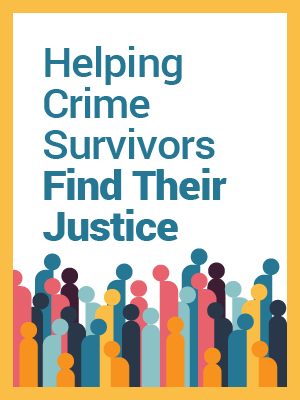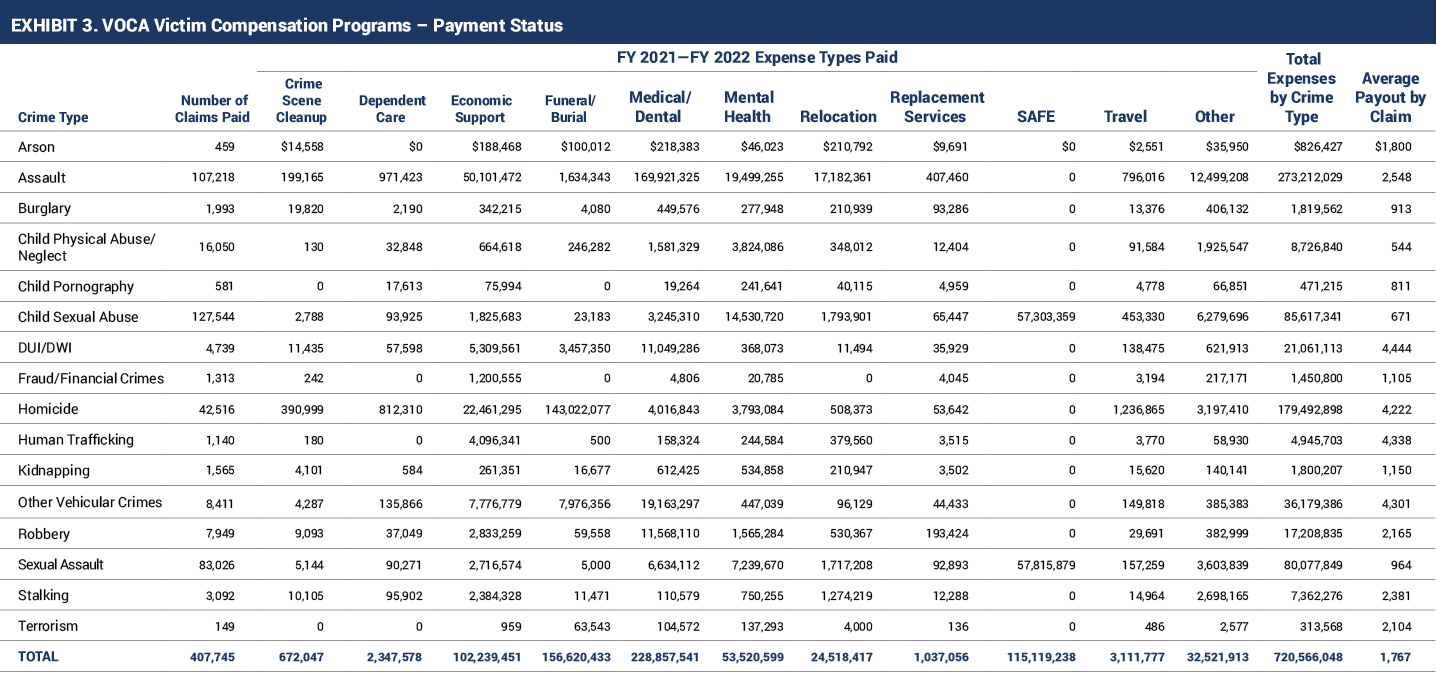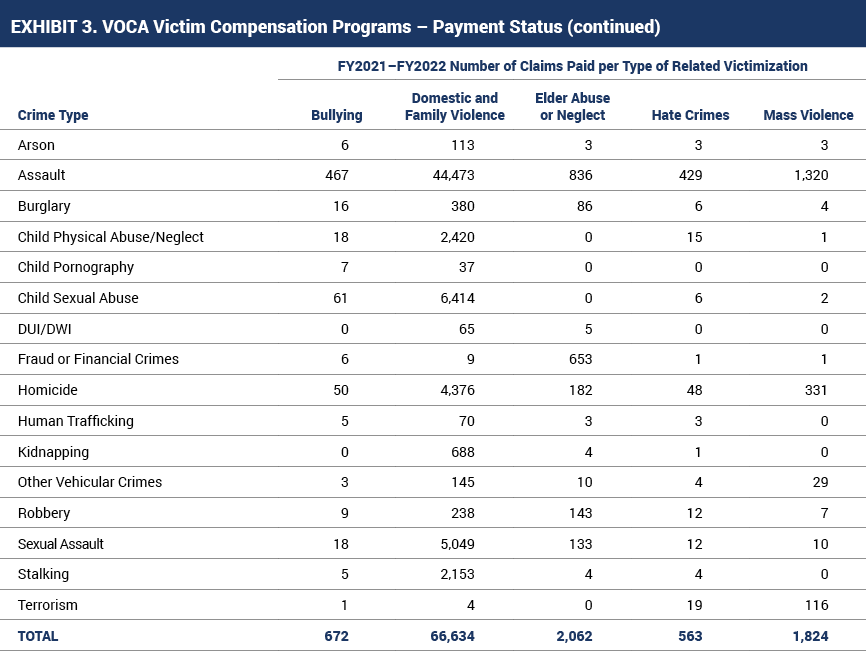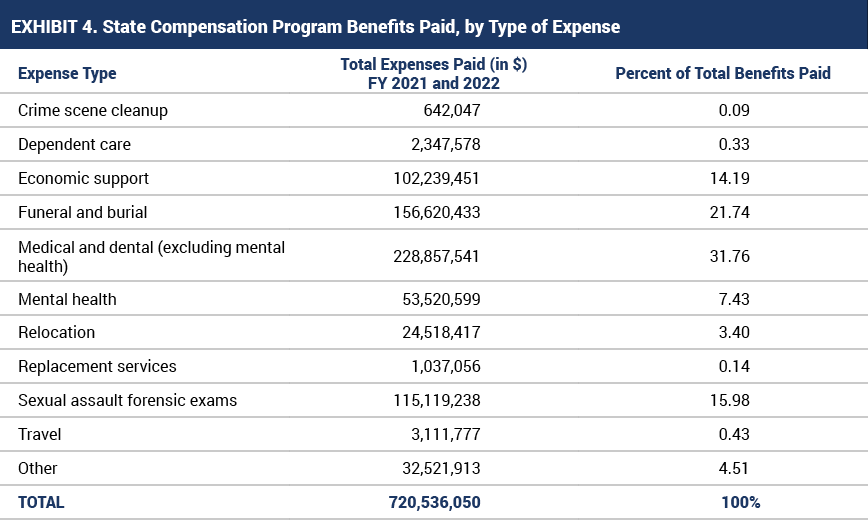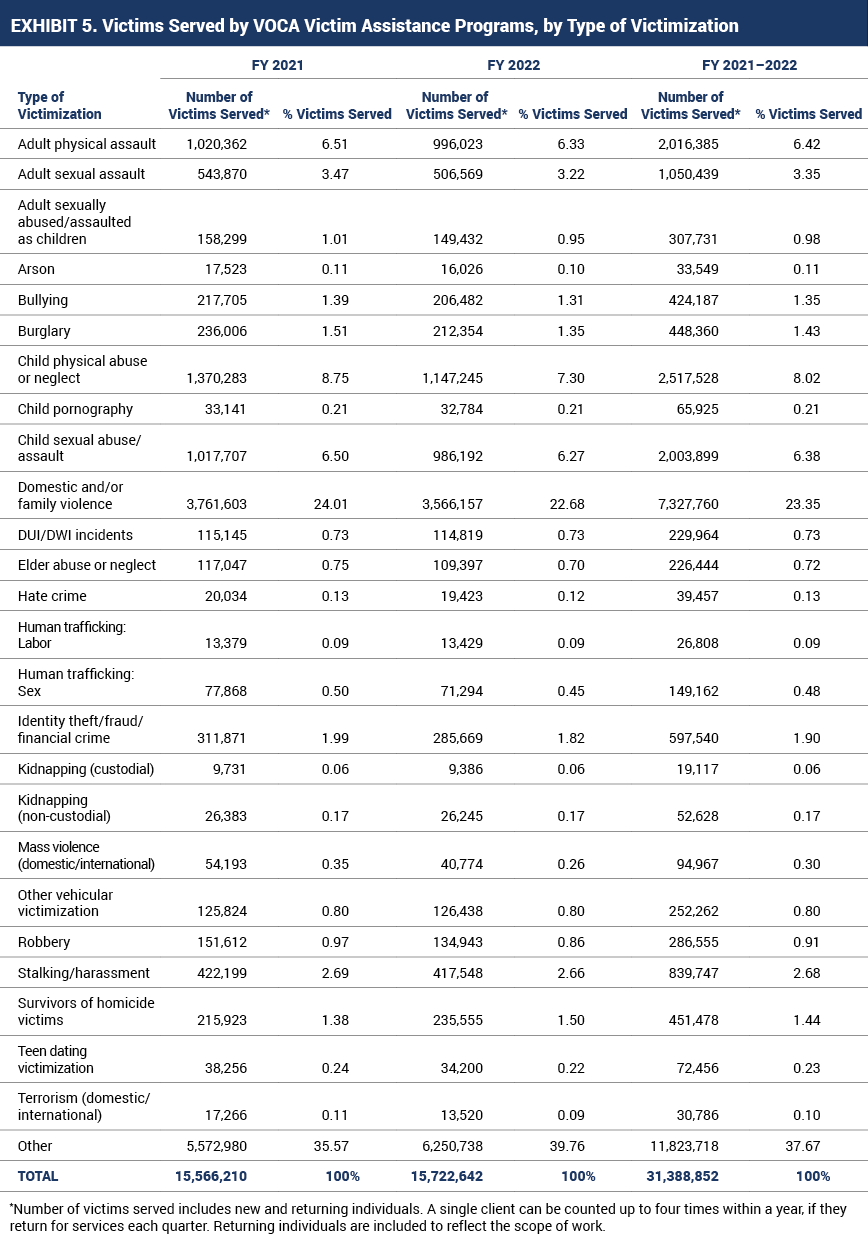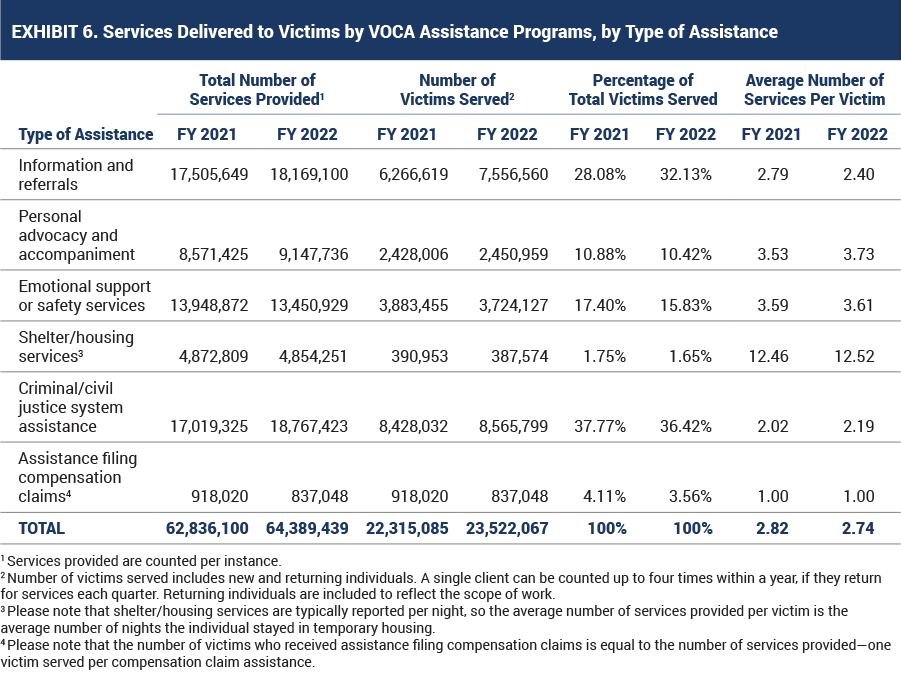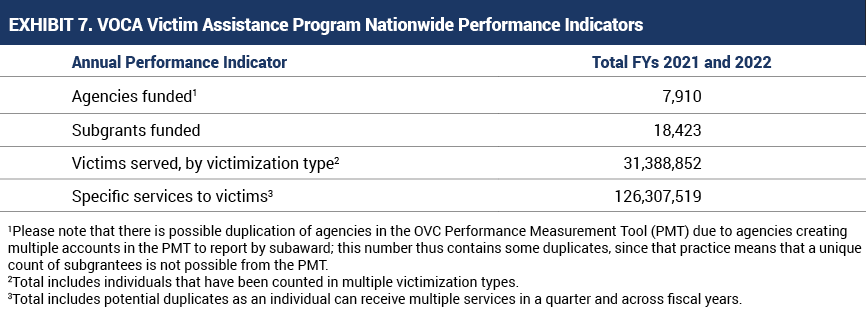Archival Notice
This is an archive page that is no longer being updated. It may contain outdated information and links may no longer function as originally intended.
Formula Grants: VOCA Compensation and Assistance
OVC administers two Victims of Crime Act (VOCA) formula grant programs that support crime victim assistance and compensation—the foundation of support for victims throughout the Nation. These formula grants account for approximately 95 percent of the VOCA funds that OVC disburses each year.
- The VOCA Victim Compensation Grant Program provides funding to supplement state compensation programs that reimburse victims for crime-related out-of-pocket expenses. Each year, VOCA victim compensation grants are awarded to every state, the District of Columbia, the U.S. Virgin Islands, Guam, and Puerto Rico and any other possession or territory of the United States to support costs for medical and dental care, counseling, funeral and burial expenses, and lost wages. Compensation programs may also reimburse victims for other types of expenses related to their victimization, such as travel, temporary lodging, crime scene cleanup, and dependent care. Although each state administers its program independently, most programs have similar eligibility requirements and offer comparable benefits.
- The VOCA Victim Assistance Grant Program supports thousands of direct victim assistance providers. Annual VOCA victim assistance grants are awarded to every state, the District of Columbia, Puerto Rico, the U.S. Virgin Islands, Guam, American Samoa, and the Northern Mariana Islands. Each state and territory provides subgrants to local community-based organizations and public agencies that provide services—such as intervention and crisis counseling, telephone and onsite information and referrals, criminal justice support and advocacy, shelter, therapy, and additional assistance—directly to victims. Funds may also be used to develop new programs that address emerging needs, gaps in services, and training for victim service providers.
In FY 2021 and FY 2022, OVC’s VOCA victim assistance and compensation awards totaled more than $1.2 billion and $1.4 billion, respectively. OVC awarded more than $168 million in VOCA victim compensation funds and $1 billion in VOCA victim assistance funds in FY 2021. In FY 2022, OVC awarded more than $177 million in VOCA victim compensation funds and $1.4 billion in VOCA victim assistance funds.
VOCA Compensation Statistics
- In FYs 2021 and 2022, VOCA state compensation programs made payments to 407,745 claims (see exhibit 3A and exhibit 3B) throughout the Nation totaling $720,566,048 (see exhibit 4).
- The majority of claimants whose crime-related expenses were reimbursed were victims of assault (107,218 claims paid), child sexual abuse (127,544 claims paid), and sexual assault (83,026 claims paid) (see exhibit 3A and exhibit 3B).
- Claims related to domestic and family violence accounted for 41 percent of the total number of assault claims that were reimbursed during FYs 2021 and 2022 (see exhibit 3A and exhibit 3B).
- Costs related to medical and dental care during FYs 2021 and 2022 accounted for 31 percent of the total expenses reimbursed, followed by costs associated with funeral and burial (21 percent) and sexual assault forensic exams (15 percent) (see exhibit 4).
- The overall average compensation per claim during the reporting period was approximately $1,767, with DUI/DWI payouts averaging the most, at $4,444 per claim (see exhibit 3A and exhibit 3B).
VOCA Assistance Statistics
- In FYs 2021 and 2022, a total of 31,388,852 crime victims identified by victimization type received VOCA-funded assistance throughout the Nation (see exhibit 5 and exhibit 7), provided by 7,910 subgrantees through 18,423 subawards (see exhibit 7).
- Victims of domestic violence, who numbered 7,327,760, accounted for 23 percent of victims who received assistance during the reporting period (see exhibit 5).
- More than 2.5 million victims of child physical abuse or neglect (over 8 percent of crime victims) received assistance—the second highest served type of victimization (see exhibit 5).
- Other types of crimes resulting in a marked percentage of victims receiving assistance in FYs 2021 and 2022 included adult physical assault (6.4 percent), child sexual abuse/assault (6.3 percent), adult sexual assault (3.3 percent), and stalking/harassment (2.6 percent) (see exhibit 5).
- In FYs 2021 and 2022, the most common type of assistance provided to victims was shelter/housing services, averaging 12.5 percent per year over the 2 years (see Exhibit 6).
- In FYs 2021 and 2022, VOCA assistance grants supported 126,307,519 specific services. Many individuals need more than one type of assistance in the aftermath of victimization. During this time period, each victim received an average of four services (see exhibit 7).
Grantees Report Performance Measure Data
VOCA victim assistance and victim compensation formula grants continue to report their data using the Performance Measurement Tool (PMT). In FYs 2021 and 2022, in addition to annual reports and training materials, data from the PMT supported 174 ad hoc data requests. Data requests supported the President’s budget, the Presidential remarks as he signed the VOCA Fix legislation, VOCA-funded victim service providers in areas of mass violence incidents, OVC grantee site visits, OVC staff conference presentations, and reports to Congress, among other initiatives.
OVC is transitioning to JustGrants, which will combine grant, financial, and payment management into a streamlined, end-to-end grants management system that offers applicants and grantees an improved user experience throughout key parts of the grant management lifecycle. PMT and OVC’s other data collection systems will continue to be used until JustGrants can fully support all performance management functionality.
Support for State Administering Agencies
OVC State Administrating Agencies (SAA) Support Team
The OVC State Administering Agencies Support Team assists SAAs in effectively managing the fiscal, programmatic, and award monitoring efforts for their victim assistance program funding. They provide tailored technical assistance, mentoring, and resource sharing on needs assessments and outreach, staff roles and responsibilities, risk assessments, policies and procedures, award cycles and application processes, communication, financial strategies, and data gathering and use.
During the reporting period, the team held learning presentations on leveraging VOCA funds to support legal services, identifying effective risk assessment tools and processes, creating resilient agencies to support capacity, strategizing for VOCA funding cuts, and implementing longer funding cycles.
They also translated a number of documents, such as communication strategies, into Spanish and assisted with the translation of OVC documents including the VOCA Fix bulletins, the VOCA Rule, and subrecipient data reporting.
OVC Center for VOCA Administrators
The OVC Center for VOCA Administrators (OVC VOCA Center)—a project of the Office for Victims of Crime’s State Victim Resource Division managed by the National Criminal Justice Association (NCJA)—was launched in 2021 to support victim assistance and compensation administrators in managing and administering their Victims of Crime Act (VOCA) funding.
Between August 2021 and September 2022, the center conducted 66 training events, with more than 1,345 registrants from 53 states and territories, on issues such as managing declining funding while expanding services, reaching underserved and unserved survivors, providing services in rural states, and addressing staffing challenges. Thirty-five percent of the trainings were related to victim assistance, 46 percent were related to victim compensation, and 19 percent were related to both.
The OVC VOCA Center also provided 182 instances of technical assistance to states and territories and held listening sessions on various topics, including the compensation guidelines, gun violence, and rising rates of homicide.
Crime Survivors, the Power of the Personal Story
Launched to coincide with the 2022 National Crime Victims’ Rights Week, the OVC Center for VOCA Administrators developed this podcast series to highlight promising practices and areas for improvement, and advance policies and practices in the victim services field that center on the experiences of a diverse group of survivors. Listeners hear from survivors about how to make rights, access, and equity for all victims a reality in their lives; and about the challenges they face on their journey toward justice.


